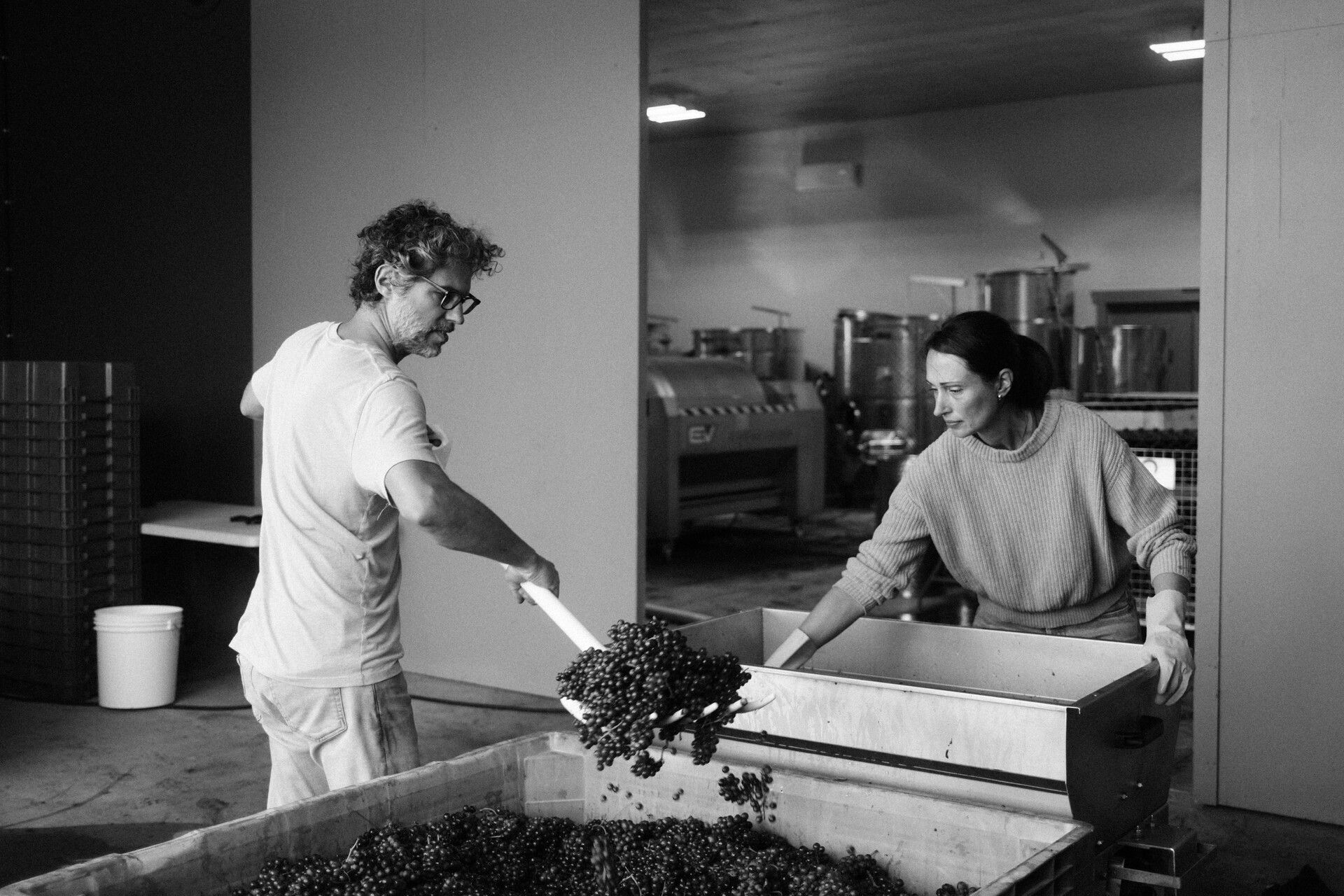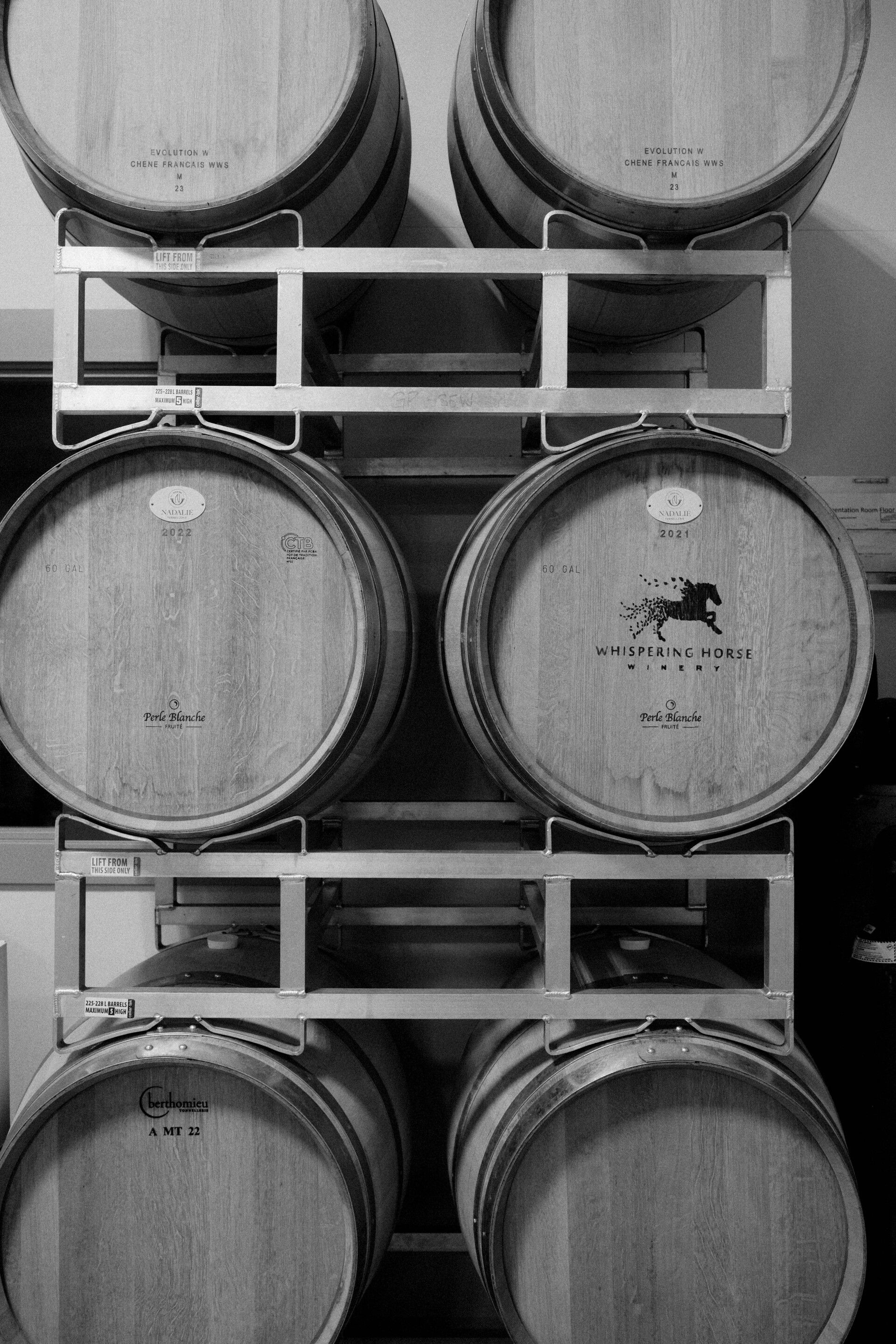
Laurent Fadanni and Melissa Giesbrecht (Credit: Dawson Friesen)
On the edge of Yarrow, where the Fraser Valley’s farmland rises into the lower folds of Vedder Mountain, sits a property the Giesbrecht family has cared for across three generations. For decades, it was J-Bar Ranch, a working horse operation run first by Melissa Giesbrecht’s grandfather and then by her father, Barry. Melissa grew up riding in the arena; her mother, Shirley, brought creativity to the ranch’s design and raised three children in the home next door. Horses weren’t just animals here—they were the identity of the land.
But by the early 2010s, the ranch had dwindled to its last few horses. Barry and Shirley didn’t want to sell, yet it wasn’t clear who would run another horse operation. For the first time, the future of the property felt uncertain.
Then came a visit from Melissa and her partner, Laurent Fadanni, a poet, playwright, and philosopher from Belgium. Fadanni grew up in Liège, surrounded by Italian family and European wines, and had spent his adult life writing, directing theatre, and traveling. He met Melissa in Montreal and followed her west, expecting only a family visit—until he stood on the pastures behind the arena and felt something shift.
“When we heard the land might be donated… we thought, ‘This is too beautiful. We have to do something,’” Fadanni says.
He had been studying wine through WSET programs and had apprenticed on an organic vineyard in Montalcino. The idea of converting the horse ranch into a vineyard seemed improbable but irresistible. “I had never grown anything. I had never made wine,” he says. “But they always say in Canada you can reinvent yourself. So I thought, okay—let’s embrace the adventure.”
He and Melissa approached her grandfather with a proposal: keep the land in the family, but transform its purpose. The answer was yes. Whispering Horse Winery was born.

(Credit: Dawson Friesen)
Fadanni planted the first 3,500 vines in 2012 and enrolled in Washington State University’s viticulture and oenology programs. Nearly every expert warned him about the Fraser Valley’s challenges. “It’s a marginal cool climate,” he says. “The vines bud late. The season is short. The humidity brings disease pressure. Everything was against it.”
But he had a vision for the wines he wanted to make—minimal-intervention, honest, and expressive—and that meant choosing grapes that could succeed without manipulation. “If I planted Chardonnay or Riesling here, I’d have to cheat: add sugar, de-acidify, fix problems,” he says. “That was out of the question.”
Instead, he studied what was thriving in Nova Scotia and other cool, wet regions. Early-ripening hybrids like L’Acadie Blanc looked promising, even though he had never tasted wines made from them. “In my mind, if the vines are happy here, the wine will be good,” he says.
His instinct proved right. By 2016, Whispering Horse released its first vintage—just 200 bottles. Today the winery will produce about 25,000 bottles annually from 11 acres of estate vines, with more plantings still maturing. Every grape comes from the property. “There’s no over-ripeness, no power,” Fadanni says. “These wines are all freshness, elegance, minerality. You can taste the cool climate.”

(Credit: Dawson Friesen)
Whispering Horse is a true family project. Barry handles the tractor work and farm tasks, bringing decades of practical experience. Shirley shapes the design and creative identity of the winery. Melissa, a PhD-level health geographer and researcher, works across the vineyard and the business, and is preparing to manage the new tasting room. Fadanni brings his artistic and technical training together in the cellar.

(Credit: Dawson Friesen)
The Fraser Valley now has more than two dozen wineries, and the region’s wine culture is gaining energy. Fadanni believes there’s still room for it to grow—especially in ways that go beyond tastings and flights. “When we moved here, I realized some things were missing,” he says. “Art, philosophy, culture, places to talk and think. People don’t always know they miss it, but they do.”
With Whispering Horse’s new tasting room opening this spring, the team plans to fill that gap. They imagine cine-club screenings of classic European films, philosophers’ cafés, and jazz concerts meant to be listened to—not strummed as background ambience. “I don’t want entertainment in the corner,” Fadanni says. “I want art at the centre.”

An early look at Whispering Horse’s new tasting room. (Credit: Dawson Friesen)
Fadanni could have built a larger winery. He could have bought Okanagan fruit and doubled his production. He could have chased distribution. But that was never the point.
“Our goal was never to sell wine across Canada,” Fadanni says. “Wine is a way to bring people together.”
And then he adds the line that now seems to define Whispering Horse—its past, its future, and everything in between:
“For me, I'm not making wine for the love of wine, but really for the love of people,” he states. “I’m trying to build a community and to bring something here that you can’t find anywhere else in the Fraser Valley.”

